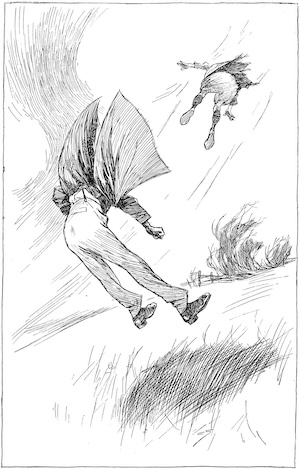Science Fiction
Dictionary
A B C D E F G H I J K L M N O P Q R S T U V W X Y Z
Latest By
Category:
Armor
Artificial
Intelligence
Biology
Clothing
Communication
Computers
Culture
Data Storage
Displays
Engineering
Entertainment
Food
Input Devices
Lifestyle
Living Space
Manufacturing
Material
Media
Medical
Miscellaneous
Robotics
Security
Space Tech
Spacecraft
Surveillance
Transportation
Travel
Vehicle
Virtual
Person
Warfare
Weapon
Work
"Bureaucracies hide their mistakes, because people's careers are tied to those mistakes. Therefore, bureaucracies are a perfect mechanism for perpetuating mistakes."
- Frank Herbert
| Cavorite | ||
| An antigravity metal; when it cools, whatever it covers will be impervious to gravitational forces. |
The creation of an antigravity metal was somewhat unexpected, and therefore created quite a stir.
| On the 14th of October, 1899, this incredible substance was made!
Oddly enough, it was made at last by accident, when Mr. Cavor least expected it. He had fused together a number of metals and certain other things - I wish I knew the particulars now ! - and he intended to leave the mixture a week and then allow it to cool slowly. Unless he had miscalculated, the last stage in the combination would occur when the stuff sank to a temperature of 60 Fahr. But it chanced that, unknown to Cavor, dissension had arisen about the furnace tending. Gibbs, who had previously seen to this, had suddenly attempted to shift it to the man who had been a gardener, on the score that coal was soil, being dug, and therefore could not possibly fall within the province of a joiner; the man who had been a jobbing gardener alleged, however, that coal was a metallic or ore-like substance, let alone that he was cook. But Spargus insisted on Gibbs doing the coaling, seeing that he was a joiner and that coal is notoriously fossil wood. Consequently Gibbs ceased to replenish the furnace, and no one else did so, and Cavor was too much immersed in certain interesting problems concerning a Cavorite flying machine (neglecting the resistance of the air and one or two other points) to perceive that anything was wrong. And the premature birth of his invention took place just as he was coming across the field to my bungalow for our afternoon talk and tea. ..."You are quite clear that the stuff is opaque to gravitation, that it cuts off things from gravitating towards each other? "
 ("I was progressing in great leaps and bounds". (Bedford and Cavor are caught in a violent windstorm caused by cavorite.))
"Yes," said I. "Yes."
|
| Technovelgy from The First Men in the Moon,
by H.G. Wells. Published by Unknown in 1901 Additional resources -
|
Here's how the spacecraft worked:
Compare to helium metal from In the Deep of Time (1879) by George Parsons Lathrop, apergy from Across the Zodiac (1880) by Percy Greg.
The inner glass sphere can be air-tight, and, except for the manhole, continuous, and the steel sphere can be made in sections, each section capable of rolling up after the fashion of a roller blind. These can easily be worked by springs, and released and checked by electricity conveyed by platinum wires fused through the glass. All that is merely a question of detail. So you see, that except for the thickness of the blind rollers, the Cavorite exterior of the sphere will consist of windows or blinds, whichever you like to call them. Well, when all these windows or blinds are shut, no light, no heat, no gravitation, no radiant energy of any sort will get at the inside of the sphere, it will fly on through space in a straight line, as you say. But open a window, imagine one of the windows open. Then at once any heavy body that chances to be in that direction will attract us."
Comment/Join this discussion ( 0 ) | RSS/XML | Blog This |
Additional
resources:
More Ideas
and Technology from The First Men in the Moon
More Ideas
and Technology by H.G. Wells
Tech news articles related to The First Men in the Moon
Tech news articles related to works by H.G. Wells
Cavorite-related
news articles:
- Mirrors For Gravitational Waves
| The New Habitable Zones Include Asimov's Ribbon Worlds |
| Will Space Stations Have Large Interior Spaces Again? |
| Reflect Orbital Offers 'Sunlight on Demand' And Light Pollution |
| Chrysalis Generation Ship to Alpha Centauri |
Want to Contribute an
Item?
It's easy:
Get the name of the item, a
quote, the book's name and the author's name, and Add
it here.
| <Previous | Next> |
|
|
|
Technovelgy (that's tech-novel-gee!) is devoted to the creative science inventions and ideas of sf authors. Look for the Invention Category that interests you, the Glossary, the Science Fiction Invention Timeline, or see what's New.
|
Science Fiction
Timeline
1600-1899
1900-1939
1940's 1950's
1960's 1970's
1980's 1990's
2000's 2010's
'...there's a narrow belt where the climate is moderate.'
'... with the Master-operator all you have to do is push one! A remarkable achievement!'
'Not like me. A T-1000, advanced prototype. A mimetic poly-alloy. Liquid metal.'
'It was riddled with holes that were the mouths of tunnels.'
'The massive feet working the pedals, arms and hands flashing and glinting...'
'There were cubic miles of it, and it glistened like a silvery Christmas tree...'
'Jason had been guiding the caravan of cars as usual...'
"The robot solemnly hit a ball against the wall, picked it up and teed it, hit it again, over and again...'
